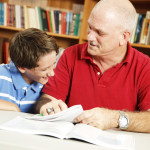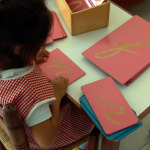Language occurs in two basic ways. Receptive language is what we understand. Expressive language is what we can say. For most of us our receptive language is larger than our expressive language. A twelve-month-old can follow simple directions but can’t talk. At the doctor’s office, we can understand the doctor’s explanation of our diagnosis and […]
Beginning a Conversation
We were looking forward to spending the weekend with old friends and their eight- and ten-year-old sons, whom we had never met. As soon as quick introductions were made, the boys picked up their electronic game machines and headed toward the den. At dinner the boys made plates of food and sat at the coffee […]
A Secret Of Good Teaching
Between the ages of birth to four-and-a-half, children are in a sensitive period for refining their senses. Children at this age are capable of learning to discern hundreds of qualities of the things around them. Perfect pitch is acquired before the age of six. Too often adults stop giving information after certain basics are mastered. […]
The Brain Craves Clear and Precise Information
During the first six years of life, the child’s natural development includes the formation of language, with the most intense activity occurring during the first two and a half years of life. It seems like common sense to say that the more words a child hears during those first two years of life the larger […]
Help with Stuttering
“Kate has started to stutter. What should I do? How can I help her?” Doug, father to three-year-old Kate, asked. As we develop spoken language, stuttering is a symptom of expressive skills lagging behind receptive language skills. If we think about receptive language being our reservoir of words and understanding, and expressive language as the […]
Sensitive Periods: Language Development Is Critical
From birth to six, children are in a critical period of language development, when the spoken word develops naturally. Ninety percent of our adult conversational language is in place by the age of six. If a child does not speak by age six, it is improbable that the child will acquire spoken, written or sign […]
Creating Phonemic Awareness
Around age two-and-a-half to three, your child becomes aware that words are made up of individual sounds. This skill is called phonemic awareness. “Phonemic” comes from the word “phonics,” which means sounds. When you help your children become aware of the individual sounds in words, you are helping them develop a very important skill for […]







